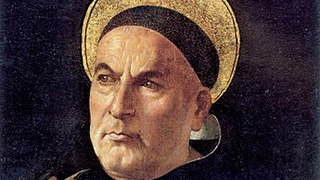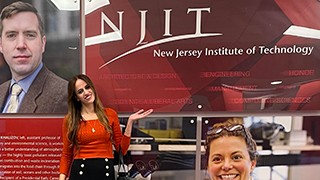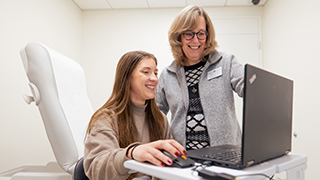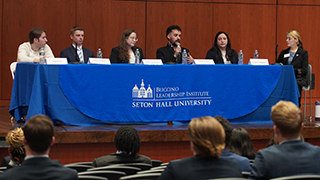Inside the Core, We Read of Faith and Reason
Wednesday, February 14, 2024

Saint Thomas Aquinas by Sandro Botticelli
Inside the Core this week and next week, we are looking at the medieval writings of Ibn Rushd, Moses Maimonides, and Thomas Aquinas - Islamic, Jewish, and Christian scholars, respectively - all of them inspired by the works of Aristotle and bringing together faith and reason. In my own class, we cover these writers with Maimonides first, Aquinas second, and Rushd third, with a focus when we cover Aquinas on his connection with the start of the growth of universities in Europe. In light of that focus, it seems a good time to consider the essence and purpose of a Catholic University.
As we will be reviewing in class, the concept of a university in western cultures developed out of the Catholic Church’s desire to enlighten clerics, in a situation where reason and faith were increasingly seen as supporting each other, not in conflict. Islamic scholars began the translation of Aristotle into Arabic, and their interest spread to both Jews and Catholics in an early form of inter-religious dialogue. One might argue that this intersection of ideas helped set the stage for the great Catholic universities of Europe, where theology reigned as "queen of the sciences," and scholars pursued the other disciplines in light of their connection to faith, but always with respect for reason.
Aquinas, of course, studied at the University of Paris and taught there as a bachelor of science. This university was started in 1045, but it is fascinating to look at the proliferation of other universities developed within the same time frame (roughly 1100-1300). In 1088, the University of Bologna started, with the charter granted in 1158; the University of Oxford in 1096; the University of Vincenza in 1204; the University of Cambridge started in 1209; the University of Padua started in 1222, and the list goes on. All of this information is available online in various sources, but the point is clear - there was a proliferation of universities starting around the same time. Our university, started in 1856 by the nephew of St. Elizabeth Ann Seton, exists in light of this legacy, of which Thomas Aquinas, such an important figure in the Catholic intellectual tradition, was a big part of our tradition here at Seton Hall.
What did he have to say about faith and knowledge and how they connect? In his Summa Contra Gentiles, which we read in the Core, Aquinas says, "In the name of the divine Mercy, I have the confidence to embark upon the work of a wise man, even though this may surpass my powers, and I have set myself the task of making known, as far as my limited powers will allow, the truth that the Catholic faith professes… To use the words of Hilary: 'I am aware that I owe this to God as the chief duty of my life, that my every word and sense may speak of Him.'" These words convey some key attributes of Aquinas – words that often do not go together in our modern conceptions of academic excellence: confidence, humility, and love. He has confidence to pursue "the work of a wise man," and Aquinas did that with diligence and faithfulness, according to one story, dictating four books at the same time. However, he combines his intellectual ability with an awareness of its limitations, along with a deep motivation of love, for God and others. As he quotes Hilary, "that my every word and sense may speak of Him."
We have a beautiful legacy that we are privileged to explore in the Core. Though we have changed our logo to "What great minds can do," let us recall also our former logo, "A place for the heart, the mind and the spirit." Though he certainly had a "great mind," Aquinas never lost sight of the heart and the spirit that must inform the use of the mind. To close, let us recall what a much more recent saint said of Catholic universities, John Paul II, in Ex Corde Ecclesia, words which, interestingly enough, echo those espoused by Rushd and Maimonides in their own attempts to link faith and reason:
It is the honor and responsibility of a Catholic University to consecrate itself without reserve to the cause of truth. This is its way of serving at one and the same time both the dignity of man and the good of the Church, which has "an intimate conviction that truth is (its) real ally... and that knowledge and reason are sure ministers to faith"(7). Without in any way neglecting the acquisition of useful knowledge, a Catholic University is distinguished by its free search for the whole truth about nature, man and God. The present age is in urgent need of this kind of disinterested service, namely of proclaiming the meaning of truth, that fundamental value without which freedom, justice and human dignity are extinguished. By means of a kind of universal humanism a Catholic University is completely dedicated to the research of all aspects of truth in their essential connection with the supreme Truth, who is God.
Categories: Education, Faith and Service





